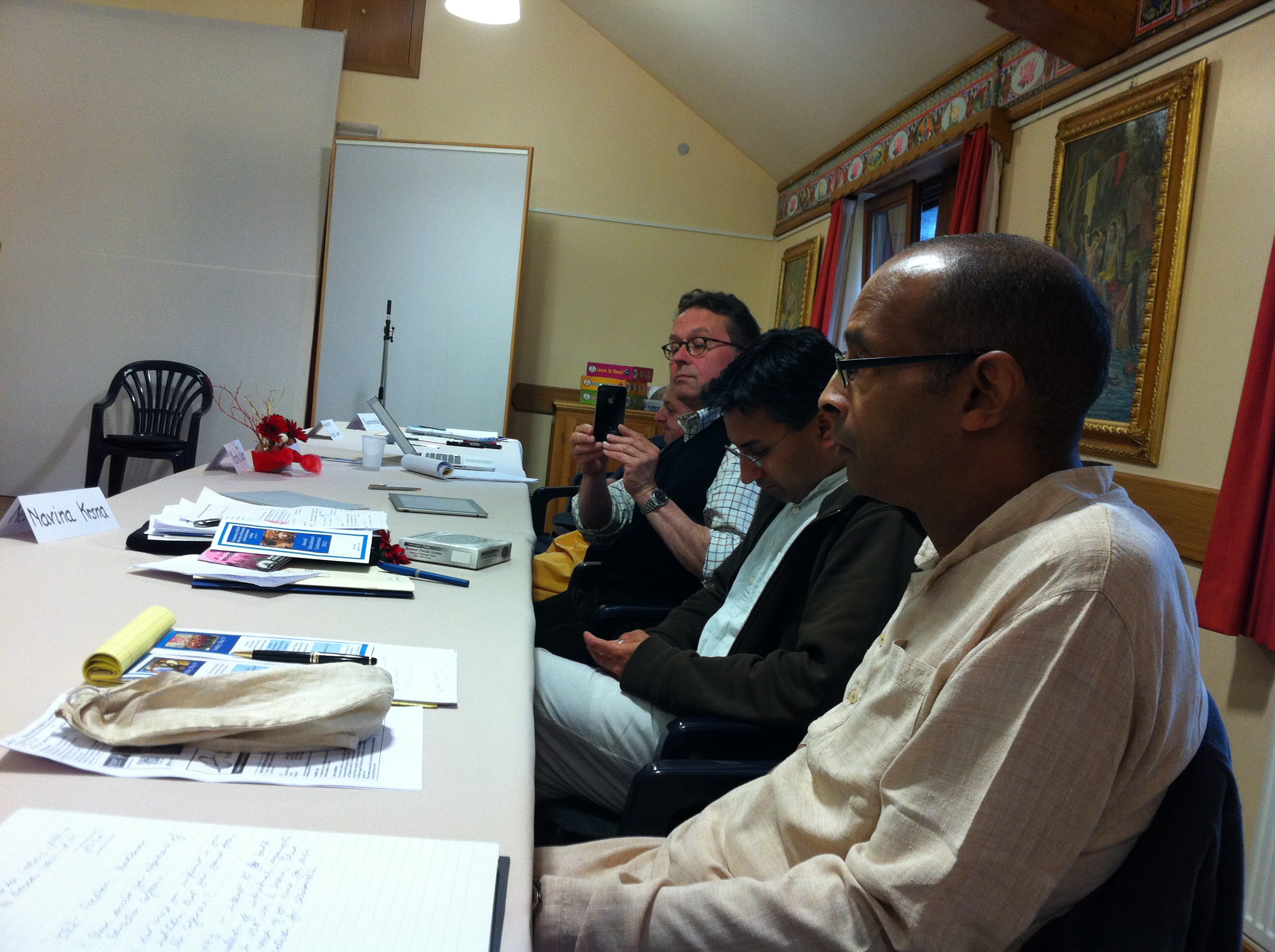International Conference Revitalises Education in ISKCON
By Madhava Smullen | Май 26, 2012

Thirty delegates from twenty-one different educational initiatives attended ISKCON’s first International Educational Conference for many years—subtitled “Revitalising Education in ISKCON”—in Radhadesh, Belgium on May 4th, 5th and 6th this year.
Initiatives represented included children’s schools such as the Krishna Avanti family of schools in the UK, The Bhaktivedanta Manor Primary School, Bhaktivedanta Academy in Alachua, Florida, and TKG Academy in Dallas, Texas.
Higher education institutions for adults were also represented, including The Vrindavana Institute for Higher Education, Mayapur Institute for Higher Education, Instituto de Estudios Bhaktivedanta in Spain, and some non-ISKCON organizations such as Lusofona University of Lisbon in Portugal and The North American Institute for Oriental and Classical Studies.
Finally, delegates also arrived from various administrative educational bodies in ISKCON, such as ISKCON Educational Services in the UK, the ISKCON Global Ministry of Educational Development, the ISKCON European Ministry of Education, the ISKCON Sastric Advisory Council, and Vaishnava Training & Education.
The Conference was conceived in the fall of 2011 by the i-Foundation—which is behind the Krishna Avanti family of schools—and Bhaktivedanta College, while the organizations were discussing a collaborative partnership that would enhance both of their educational projects.
“The Conference was a groundbreaking effort to bring education to the forefront in ISKCON,” says Divisional Director of ISKCON Education Raghupati Das. “It was meant to bring various educational institutions and dedicated individuals within ISKCON together to share best practices and tackle challenges, so that ISKCON education can make an impact both within ISKCON and outside in the mainstream society.”
Attendees gathered in Radhadesh’s Community Hall at midday on Friday May 4th for a welcome and orientation by Bhaktivedanta College Principal Yadunandana Swami and i-Foundation chairman Navina Krishna Das.
This was followed by a Key Note Speech by Mark Evans, a Church of England priest and educational consultant, who also serves as the Managing Director of Avanti Education Services in the UK. Evans, sharing his lifelong educational experience in Anglican Church-related educational initiatives, established a solid foundation for the discussions that took place during the rest of the Conference.
Next came ‘Learning from the History,’ a presentation by ISKCON Minister of Educational Development Sesa Das. Showing a video interview with Laxmimoni Dasi, one of the seniormost educators in ISKCON, he explained that many powerful lessons can be learned from the society’s past. Emphasizing the need to understand noble ways to do things, he described educators as agents of change. In order to bring about positive transformation, he added, the culture needs to change.

Yadunandan Swami making a presentation on collaborative partnerships
Concluding the Conference’s first day, which ran until 6pm, was ‘Building Resources for the Future of ISKCON Education,’ an innovative PowerPoint presentation by Raghupati Das which included paired group exercises, interactive group work, and presentations from participants.
“I defined resources and explained that in order to run spiritual institutions two kinds of resources are needed: Spiritual, such as faith, devotion, knowledge, and inspiration; and material, such as manpower, financial capital, and buildings,” Raghupati says. “I gave the example of Srila Prabhupada, who came to the West with practically no material resources. His story serves as an eternal inspiration that if we have a sincere desire to serve, then Krishna provides the resources.”
Raghupati also spoke about using professional analytical tools to build organizational capability to move forward. Attendees then participated in a group exercise, where they had to think of a successful ISKCON educational project and discuss what challenges it faced, and how it dealt with them. Finally, many attendees made their own presentations, and shared some best practices with the rest of the participants.
On Saturday May 5th, the Conference began at 10:30am, with a panel discussion on ISKCON’s Philosophy of Education, led by Hanumat Presaka Swami, Urmila Dasi, and the Conference Director Rasamandala Dasa, who is also a course director at Bhaktivedanta College. There were discussions on employability and placement for ISKCON educators, partnerships and collaboration among educational institutes.
Other speakers included Gauri Dasa, Kapila Dasa, and Navina Krishna Dasa of the UK, who, along with several Bhaktivedanta College graduates, spoke about positive career prospects.
On Sunday May 6th Yadunandana Swami led an interactive workshop on collaboration, followed by various group reports.
“The second and third days of the Conference focused on practical commitments for the delegates, that are expected to be accomplished during the year,” Yadunandana Swami says. “For example, a team was established to work on ISKCON’s philosophy of education, and another to focus on Primary and Secondary education. There were steps towards providing career guidance for ISKCON college graduates, and plans were made to develop collaborations amongst educational institutes that offer scriptural education for adults.”
There was also discussion on joint teacher training initiatives, and the collaborative development of educational and classroom resources. Meanwhile, Bhaktivedanta College officially launched its International Partnership Scheme.

Rasamandala Das and Raghupati Das
“The Scheme focuses on providing qualified staff for ISKCON-linked schools and higher education institutes, offering work-placements and internships, and enrolling more students at the College, especially for its BA courses,” says Conference Director Rasamandala Dasa. “The courses are ‘Theology and Religious Studies’ and ‘Education Studies, Theology and Religion,’ both validated by the University of Chester, UK.”
Overall, Rasamandala feels that the main theme which emerged from the Conference revolved around ‘insider-outsider’ issues, and related dialectics such as the relationships between spiritual and material education, between approaches that are either isolationist or dialogical, and between devotional and professional approaches. There was a perceived need for standards, and much discussion on the corresponding development of the theory and philosophy of education.
“The overwhelming consensus was for a more integrated approach, represented by phrases such as ‘spiritual professionalism’, ‘an inclusive transcendence’ and ‘a dialogical approach,’” says Rasamandala. “A further theme was prioritizing the wellbeing of children, young people and adults, particularly through seeing the potential in our youth and empowering them from an early age.”
When the Conference was not in session, attendees enjoyed their time at Radhadesh by taking their meals at Govinda’s restaurant, hearing morning lectures on education at the temple, and taking a guided tour around the community’s Bhaktivedanta College library, Museum of Sacred Art, and Sri Sri Radha Gopinatha’s Temple Castle.
The response to the Conference was overwhelmingly positive, with delegates commenting that it was a very positive move towards prioritizing education in ISKCON.
“Great enthusiasm was generated among the participants,” Yadunanadana Swami says. “It was enlivening to meet other fellow educators who work hard on similar projects and are faced with common challenges.”
After the Conference, all delegates were invited to join one of four working groups to make a contribution, network with others, share resources and push forward ISKCON Education. These were 1) Promoting the academic study of education within ISKCON, 2) Career Development and Guidance, 3) Collaboration between ISKCON Primary and Secondary Schools, and 4) Adult and Shastric Education in ISKCON.
Several educational projects established solid relationships for cooperation in the future, while the Krishna Avanti schools and Bhaktivedanta College consolidated their partnership. This means that Bhaktivedanta College graduates may soon get teaching positions at Krishna Avanti, starting as assistant teachers with the possibility of soon becoming full-time teachers.
“In the wake of the Conference we anticipate practical results from the four working groups, a blending of professional and devotional sensibilities, and an increased awareness of the need to place systematic education at the forefront of a strategic leadership,” Rasamandala says.
ISKCON’s International Educational Conference will now be held annually, every spring. A full Conference report is expected to be published by the end of May, and will confirm the location for the next Conference, which will be most likely held either in the UK or once again in Radhadesh.
The Ministry of Educational Development would like to encourage all educators within ISKCON to organise similar inspiring events in other parts of the world. Interested devotees can write to Raghupati Das at Raghupati.gkg@pamho.net to either discuss their ideas or promote their regional events.















